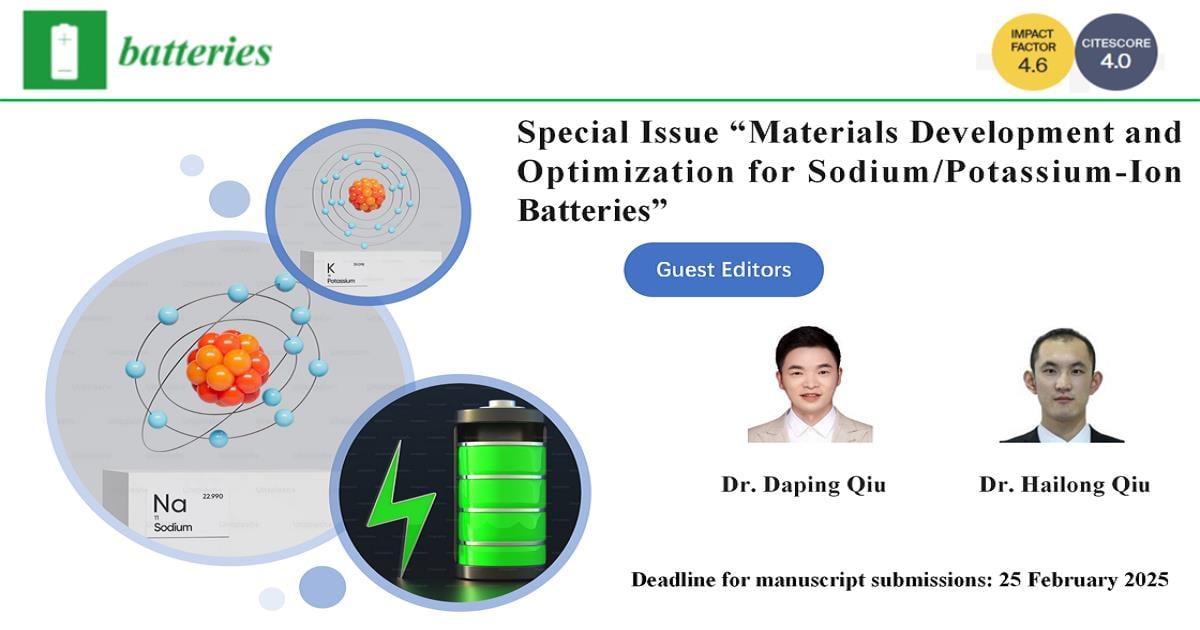Materials Development and Optimization for Sodium/Potassium-Ion Batteries
A special issue of Batteries (ISSN 2313-0105). This special issue belongs to the section "Battery Materials and Interfaces: Anode, Cathode, Separators and Electrolytes or Others".
Deadline for manuscript submissions: 25 February 2025 | Viewed by 1035

Special Issue Editors
Interests: sodium/potassium-ion battery
Interests: sodium-ion battery; all solid state battery
Special Issues, Collections and Topics in MDPI journals
Special Issue Information
Dear Colleagues,
With the continuous promotion of global carbon neutrality, there is an urgent demand to develop advanced electrochemical energy storage (EES) technologies to meet the market demands of EES systems. Over the past three decades, lithium-ion batteries (LIBs) have dominated the market of EES systems. However, the contradiction between the exponential growth in the demand for LIBs and the limited and geographical concentration of key elements required for LIBs has raised concerns about the supply of LIBs. There is urgency to develop inexpensive sodium/potassium-ion batteries to promote the realization of global carbon neutrality. Innovations in materials, especially in electrode materials, binders, solid-state electrolytes, separators, etc., are one of the key factors in incubating the next generation of sodium/potassium-ion batteries. To achieve this goal, three steps need to be implemented: firstly, developing low-cost, scalable strategies to synthesize materials with unique structures; secondly, targeted regulation of the intrinsic structure of materials to optimize their electrochemical performance; thirdly, developing advanced characterization techniques to reveal the energy storage nature and degradation mechanism of materials.
In this Special Issue, we are looking for contributions, including, but not limited to, the following:
- Rational synthesis of materials for sodium/potassium-ion batteries;
- Electrode materials with excellent electrochemical performance;
- Novel binders for sodium/potassium-ion batteries;
- Development and modification of separators;
- Construction and optimization of solid-state electrolytes;
- Advanced nanostructures for sodium/potassium-ion batteries;
- In situ characterization techniques;
- Interface behavior in sodium/potassium-ion batteries;
- New concept electrochemical energy storage devices.
Dr. Daping Qiu
Dr. Hailong Qiu
Guest Editors
Manuscript Submission Information
Manuscripts should be submitted online at www.mdpi.com by registering and logging in to this website. Once you are registered, click here to go to the submission form. Manuscripts can be submitted until the deadline. All submissions that pass pre-check are peer-reviewed. Accepted papers will be published continuously in the journal (as soon as accepted) and will be listed together on the special issue website. Research articles, review articles as well as short communications are invited. For planned papers, a title and short abstract (about 100 words) can be sent to the Editorial Office for announcement on this website.
Submitted manuscripts should not have been published previously, nor be under consideration for publication elsewhere (except conference proceedings papers). All manuscripts are thoroughly refereed through a single-blind peer-review process. A guide for authors and other relevant information for submission of manuscripts is available on the Instructions for Authors page. Batteries is an international peer-reviewed open access monthly journal published by MDPI.
Please visit the Instructions for Authors page before submitting a manuscript. The Article Processing Charge (APC) for publication in this open access journal is 2700 CHF (Swiss Francs). Submitted papers should be well formatted and use good English. Authors may use MDPI's English editing service prior to publication or during author revisions.
Keywords
- sodium-ion battery
- potassium-ion battery
- anode material
- cathode material
- solid-state electrolyte
- separator
- binder
- in situ characterization
- interface
- mechanism
- nanostructure
- material synthesis
Benefits of Publishing in a Special Issue
- Ease of navigation: Grouping papers by topic helps scholars navigate broad scope journals more efficiently.
- Greater discoverability: Special Issues support the reach and impact of scientific research. Articles in Special Issues are more discoverable and cited more frequently.
- Expansion of research network: Special Issues facilitate connections among authors, fostering scientific collaborations.
- External promotion: Articles in Special Issues are often promoted through the journal's social media, increasing their visibility.
- e-Book format: Special Issues with more than 10 articles can be published as dedicated e-books, ensuring wide and rapid dissemination.
Further information on MDPI's Special Issue polices can be found here.
Planned Papers
The below list represents only planned manuscripts. Some of these manuscripts have not been received by the Editorial Office yet. Papers submitted to MDPI journals are subject to peer-review.
Title: Sulfur modified multi-cavity carbon nanospheres anode enabling fast-charging sodium-ion batteries
Authors: Cuihua Kang, Yuehui Wang, Daping Qiu*
Affiliation: China Three Gorges University
Title: Pore structure regulation of hierarchical porous carbon derived from pitch for high-performance supercapacitors
Authors: Lun Zheng*, Daping Qiu
Affiliation: China Shenhua Coal to Liquid and Chemical Shanghai Research Institute
Title: Photoelectrocatalytic hydrogen evolution reaction stimulated by ordered MoS2 nano-arrays
Authors: Yuanyuan Tian*, Chengnan Qi
Affiliation: Shanxi College of Technology






